Ukrinform’s new project, “Victory Commanders" highlights the leaders of various ranks and branches of the military who, with their knowledge, skills, experience, authority, and unyielding faith in Victory, have already written their names into the modern history of Ukraine.
This conversation is with Vadym Sukharevsky, call sign Barsuk (“badger”) -- a Hero of Ukraine, Ukrainian Armed Forces Colonel, commander of the newly organized Unmanned Systems Forces.
- In 2014, you authorized clearance, which went down into history, to open fire on Girkin's mercenaries. And that was the day that is considered to mark the beginning of a war between Ukraine and Russia. Did you expect or think at the time that the war would escalate into an all-out invasion?
- Actually, we did expect. When certain events began to occur even before the annexation of Crimea, when assaults on our military bases began, when our ground assault troops on vehicles began facing Russian troops head-on, we as members of the regular army already were expecting that the story will most likely not end up there. And, actually, we were getting prepared. The tasks we were performing with the forces and capabilities available to us at that time were challenging and comprehensive. These were systemic, interesting tasks, which actually resulted in what eventually triggered the Anti-Terror Operation (ATO) later --led by the Security Service of Ukraine (SBU) first, then evolved into a fully-fledged military operation. Actually, that was a logical consequence.
- Did you feel tense or anxious anticipating a full-scale invasion?
- Yes, of course, because as a human, a citizen, a patriot... One’s heart cannot but break and soul bleed over what was happening. I was angered by inability to do something about it, by the fashion the neighbor was pursuing its brazen, treacherous policies.
- During that time, you had been promoted to Colonel’s rank, to the position of a deputy commander-in-chief of the Armed Forces, now the commander of the Unmanned Systems Forces. At what time did you decide to become a military service member, who or what inspired you?
- Looking back, I can probably say that for me it was a search for my own self. I was looking for something that could make me understand who I am and what I am capable of. I came to a military draft office without waiting for a draft notice. A neighbor of mine who was employed there suggested that I join a communication force: "It's the elite there, you’ll just sit, serving your service comfortably... And why have you come at all, we never summoned you?" But I wanted to join special operations forces. Rumor has it that special operations forces are not manned by draft recruits, unlike Airborne Assault Forces or current Ground Assault Troops. I said: oh, that’s OK for me. So it turned out I’ve asked for it.
- But that job was not much favored back then, and, if I am not mistaken, you chose it in defiance of your parents…
- Dad did not understand me, because, like all parents, he, of course, wanted me to become a manager, lawyer, businessman or the like. Let's say, he could not understand why I changed my professional vector. He was trying to convince me out, but still was contributing, helping, for which I’m grateful to him very much.
- Going back to that day in 2014, when you unquestionably took the lead, while at the same time going against orders... Have you ever experienced your orders not being followed, and how do you feel about that?
- An interesting question. It should probably better be addressed to my subordinates, because it’s hard for me to assess my own actions. I tend to look more at the result of my order not being followed. If, hypothetically, I prescribed a certain way to achieve a goal, and that goal was achieved by some other way, not the one that I’ve prescribed, I don’t feel like it’s critical for me.
- Why unmanned aircraft systems? What ultimately made you choose this to be your job?
- I once said to my subordinates: we are lacking a drone of some sort; with such a drone at hand, we would be able to strike a lot. This would make an amazing video, actually. It was back in the spring of 2014. Then I proceeded further along this path. When a battalion leader, for example, every mission, be it mortar fire, reconnaissance or subversive act, was performed supported with an UAV capability. In other words, not a single munition was fired without fire being adjusted. Afterwards, in 2017, we, joined with DUK Right Sector at the Mariupol Front, started throwing grenades at the heads of separatist soldiers. I joked at the time that that wasn’t a weapon of victory, but a weapon of terrorism. But despite this all, this is what proved so effective. Then followed the year 2022, when I was promoted to lead a brigade. A fire adjustment capability is what provides us an edge on the battlefield. This went on a parallel track with the development of EW capabilities, robotic platforms that brought their effect to this activity. We devised an effective tactics, and this is from where this "eco-idea" originated - to protect the soldier, protect lives using efficacious loitering munitions, that is, fighting the adversary with unmanned systems.
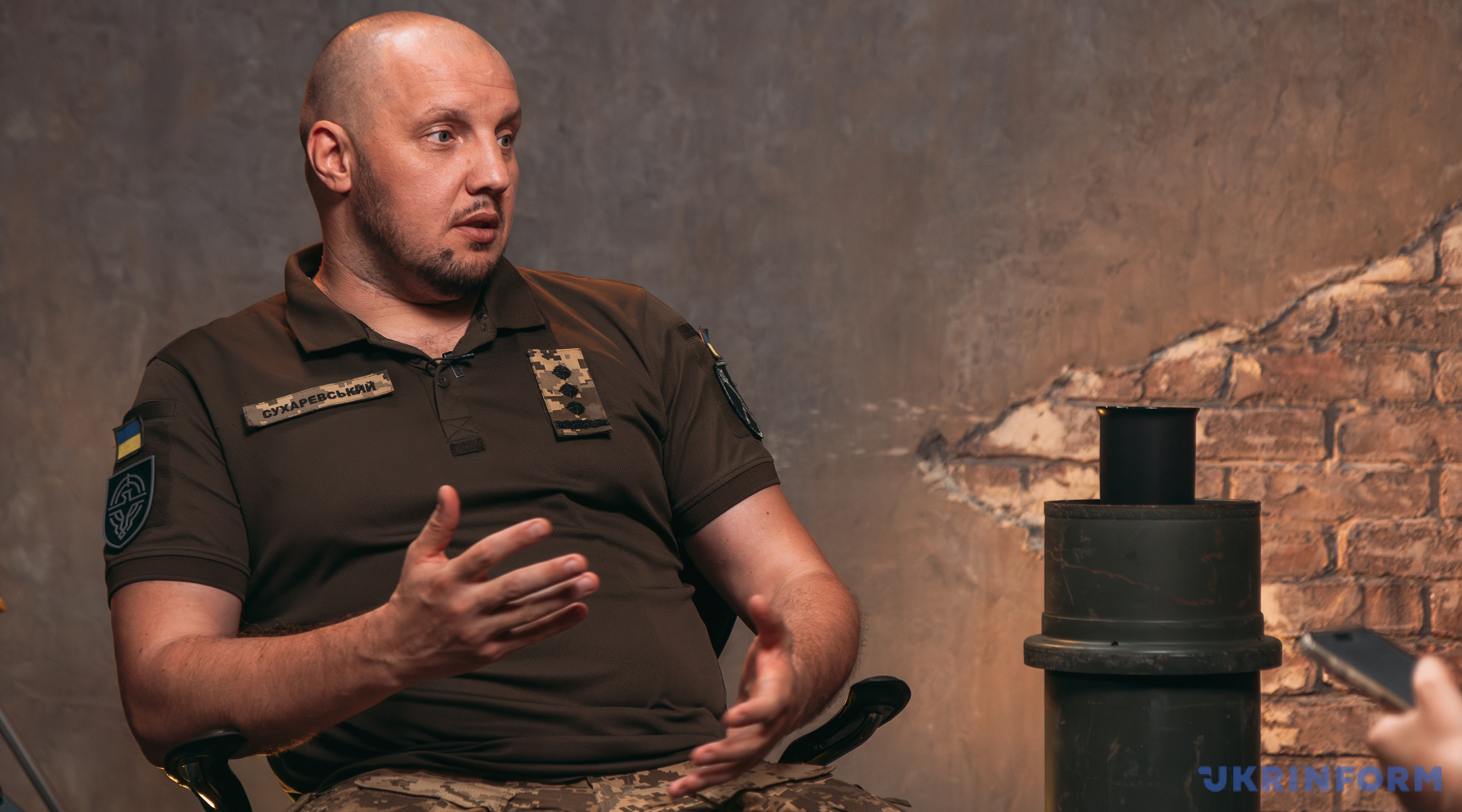
- Basically, I am always saying: this is a purely Ukrainian phenomenon. In my activities as a leader, a military manager, a commander, I am accustomed to entrusting certain work sectors to people. My task as a commander is to discover a gift, see a thirst in a man and direct him appropriately. And the fact that in a certain period of time something emerged somewhere, something was developed or upgraded, improved, invented - this is precisely the merit of those guys and girls who worked in relevant fields. My task was simple enough – not to interfere and give them the right vector of movement.
- Regarding the new structure of the Unmanned Systems Force, how is it supposed to work, basically? And what specific tasks do you set yourself in this position?
- One focus is on effectiveness, efficiency and a system approach. These forces are about a system. We are in charge of the air component, we are in charge of the land component, and we are in charge of the sea component. This encompasses doctrinal work, legal support, ammunition, technology, work with manufacturers, and field tests. This also encompasses training, which is a critical element that should be given perhaps first priority, because it is the training of skilled pilots that makes a foundation for success. You can have as many drones as you want, but if a pilot is not proficient enough, this will take its toll on effectiveness and efficiency. And I always give the example that the enemy is superior to us in many aspects, but it is precisely our pilots’ smart and quick mind, intelligence, and effectiveness that gives us asymmetry of actions, parity in many areas.
- What are the first results you’ve achieved in this position?
- The command staff and structure are still in the phase of formation, they are working in nearly all directions, and this is already a great achievement, given that human resources, preparations, training comprise a big challenge. Because previously we did not have training of officers at institutional level, especially at the command level. Second is coordinated and meticulously planned work regarding defeating the enemy at long ranges, both on its sovereign land and in Ukrainian territories it currently occupies. More than a dozen of our units are already fighting at the frontline, performing tasks in the areas of hottest fighting. Training programs are being compiled for both foreign and indigenous brands of UAVs. A robotic training ground has been set up, where Armed Forces’ units undergo training and team work, performed in the form of wargaming, encompassing an automated, systematic process of testing of all types of software, communications, and systems overlaid on an integrated battlefield picture. What does this mean? We have a workstation, that is, a command-and-control post, where officers, soldiers, sergeants work on aspects that are time-relevant for an integrated battlefield picture in heavy ECM environments, i.e. in challenging conditions where air strikes, air reconnaissance, ground components are working simultaneously, and experiments with different modes of communication are conducted so that we don’t lose initiative on the battlefield. Because we all know too well that hostile EW attacks seek to target precisely control links, particularly on our UAV systems, thus making us update technologies very often, with focus on UAV-operator links. These are very big challenges both for our industry and for the budget. This work is of critical importance, and it is being conducted very serious in these areas.
- Regarding the use of drone capabilities by the Russians - who currently enjoys an advantage, and what should be done in order to keep our leadership in this domain?
- This issue is often distorted in the media. I want to highlight the following: if we take the reconnaissance component and the strike component, which is about first-person-view (FPV) drones, then, most likely, the quantitative advantage is on the enemy’s side. But we are just returning to the point in time where we work more on quality, while at the same time not forgetting about the quantity. The government and the military command are both doing their utmost to ensure this asset is used to best effect and provided to the Armed Forces to the greatest effect possible. Like I said before, these processes, training and provision, are going on two parallel tracks. Because where we are talking about the provision proper, we are talking, first and foremost, about the availability of pilots, secondly - about the availability of capabilities, and thirdly - about the availability of ammunition for these capabilities. And these are parallel processes that are constantly communicating with each other. Plus the manufacturers whom we encourage, bring them to a higher level of quality. And what makes a big challenge for the commanding staff is make sure the manufacturer understands the vector a development should pursue, so that to avoid situations where a manufacturer comes up with a product that is no longer relevant or needed at the front line. After all, this is about economy. Therefore, this involves lots of challenges in this regard.
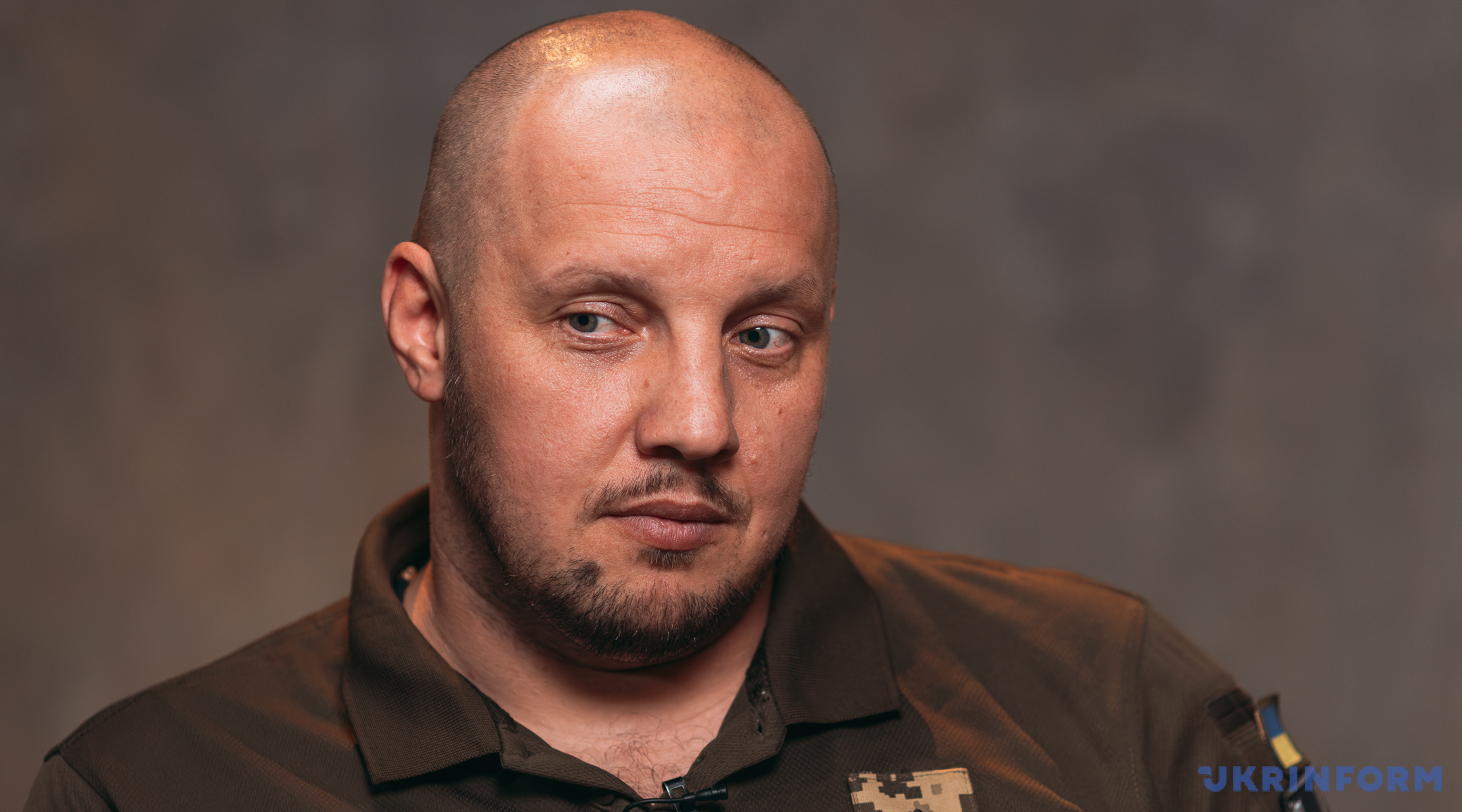
- It's already in history. On a global scale, the creation of a military branch like that compares in terms of historical military value with the creation of an air force and the coming of first warplanes or tanks to the battlefield at the beginning of the 20th century. This is a very complex and complicated process, in which we have got involved. We have made a very serious decision in terms of the national defense, because an armed service like that is untypical for any of the armed forces throughout the world. A friend of mine once said a nice utterance when talking about the military... Himself a civilian, he joined the army to fight this war. During one of his philosophical deliberations, he said that the military, basically, is an institution that employs effectively what it has historically, but is very conservative towards something innovative.
Because an innovation needs to be accustomed to, brought through a certain process needed to grow up a new generation of users, set up in place an eco-system, tactics and procedures and all related things. And what we are doing now is ten-mile steps toward that end; this work is doctrinally sound, is proceeding further and will continue to grow. And just the fact that Ukraine did it, let's say so, will be a subject for historical research for many scientific research organizations around the world; this will be studied, believe me, for decades and on the same scale as the Second World War.
- As you’ve mentioned above, the war is constantly changing, we constantly hear about the need to find new technological solutions. How fast is this process proceeding in general, how fast is the war changing and what will it be like tomorrow?
- In my subjective opinion, all the wars that will follow, the so-called fifth-generation wars, will be waged by unmanned systems. After this experience, after this war, all states will switch to separating fire from their soldiers, because, as it was at all times, the price of an unmanned system is disproportionate to soldier’s life. And, believe me, this is absolutely obvious to everyone - from North Korea to the United States. The whole question is how systematically institutions will be ready to approach large-scale projects like that. I always give one example: let those who do not believe in our war look at the recent events in the Middle East. Dozens of countries were helping Israel repel the Shakheds' attack, and they did repel it. This was just one attack, but how many similar attacks are we experiencing every day?! Let's look to the right, to the left, and see who is actually ready to fight -- without a coalition or an alliance, for example – fending off waves of Shakhed drone attacks, who is currently ready to counter massive FPV drone attacks, who has an advanced EW capability as we have? And this despite the fact that control-link connections and operating frequencies are constantly changing, and this processes continues non-stop. Therefore, I reiterate it once again: we as a state, as an army, have already reached this level, I even tell our allies about this, that this is what I will teach you and you will come to learn. We are ready, we are definitely no longer in the role of students in all these processes.
- Regarding the domestic manufacture of drones, what is the situation currently like? Basically, what a Ukrainian drone is like?
- The Ukrainian drone is comprehensive, the Ukrainian drone is smart, promising much, flexible, efficacious, and this is true for nearly all aspects. And the Ukrainian drone is not just a weapon that is game changing on the battlefield, I can say with confidence that it is one of the types of weapons of our victory. This day, we cannot imagine working without any of these components in the terms I’ve mentioned, and it is crucial that the Ukrainian drone will bring foreign currency for our state after our win.
Our manufacturers are aware of this, the world is aware of this, they are seeking our advice, looking at us, studying us. As for foreign manufacturers, I would like to note that there are not many of them across the world, of those, let's say so, who can offer a competition to our systems. Just for statistics, I will give an example that currently over 170 different unmanned system products have been authorized for combat use and have seen combat deployments at the front line.
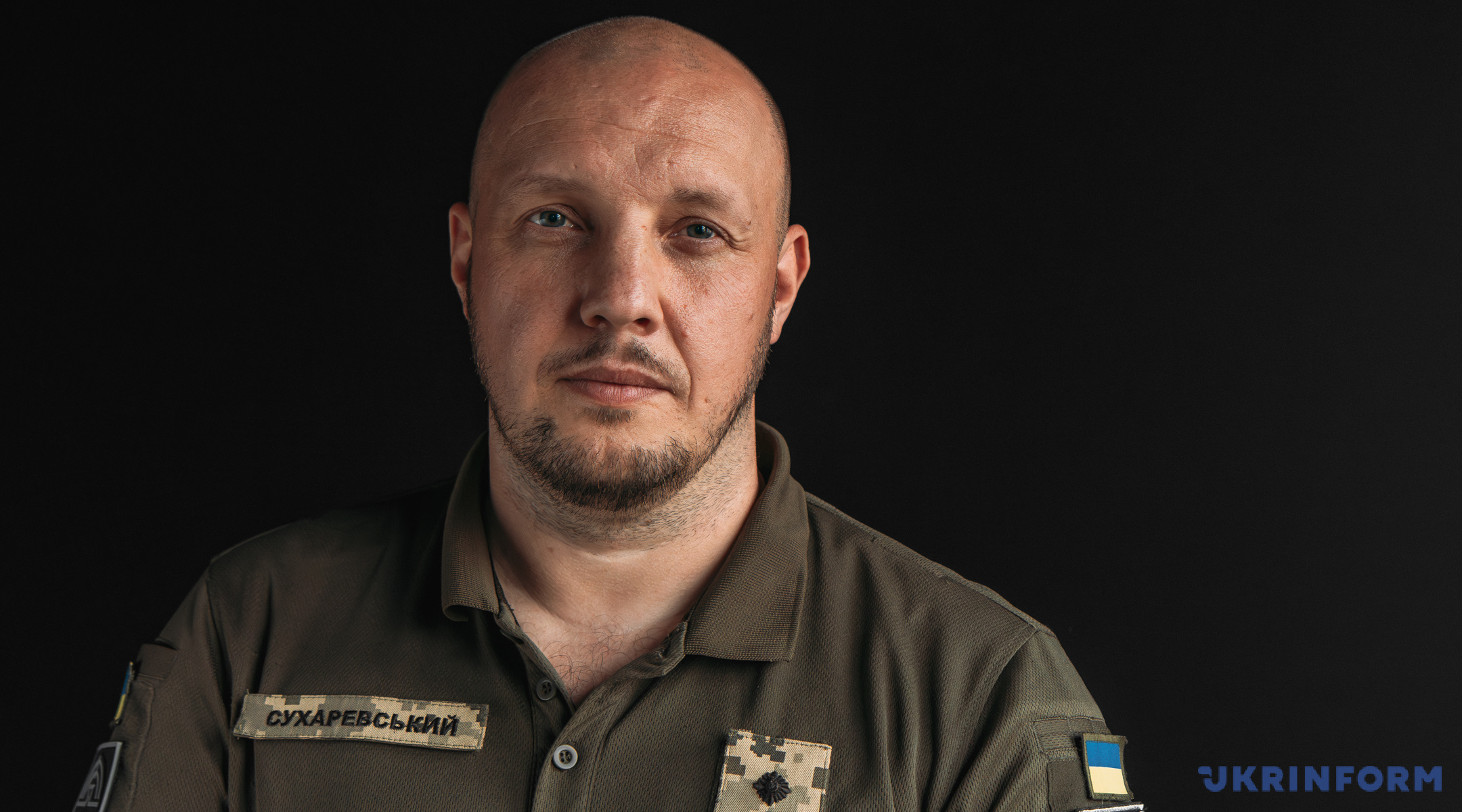
- All manufacturers are in direct contact with combat users, all manufacturers are interested in their products being effective, and all manufacturers are keen to see their weapons bringing us closer to victory and annihilating masses of the enemy. And it's amazing, very cool. I would like to add in this context that, in one hundred percent of instances, it's just nice to work and do business with our manufacturers.
- Which drone product, if any, impressed you most with its performance?
- It came as a nice discovery to me, in terms of positive emotions, to train on and work with a long-range strike drone capability like Deep Strike, for instance.
- Reports emerged saying that Ukraine has launched assembly-line production of long-range strike drones. What do you know of that?
- Long-range drones are all drones made in Ukraine, there are no foreign-made drones used for long-range attacks.
- What is the proportion between the quantities of drones provided by the government and volunteers?
- It is difficult for me to evaluate it precisely in quantitative terms. I would confine myself to saying that the aid provided by volunteers is always needed, always welcome; I offer my honor and respect to the Ukrainian volunteer movement for the support provided to our units, it will never be superfluous.
- Drones of what kind are currently required most at the front line? Does this requirement change from one sector of the front line to another?
- It is not that something is required more than something else. The requirement varies with the intensity and specifics of fighting at a specific stretch of the front line, the specifics of hostile countermeasures and tactics employed at a certain front, and, most importantly, the consumption, the number of the drones consumed. Statistically, I can say that, in a brigade-size unit, reconnaissance quadcopters, for example, produced, let's say so, by commercial, not military industries (I will not disclose the brands), are lost at an average rate of six per day of fighting.
With over one hundred brigades fighting on the battlefield, and with this intensity, procurement operations within the brigades, government-funded supplies and aid from volunteers are never ending. Reconnaissance drones, I reiterate it again, are more costly, a little fewer of them are consumed. FPV drones, instead, are consumed by the dozens every day, and this is per one pilot. In the days when I led a brigade, for example, I saw an average consumption of 50-60 drones per day, with an average intensity of fighting. This allows you to hold defensive lines, to think about advancing or stopping. This is a complex operation involving nighttime bomb droppings from copter drones, followed by ground fires. This, unfortunately, is just one thing that makes war so expensive, but everything that can save our soldiers’ lives and push the enemy away from them must be there on the battlefield.
- There is an opinion that operating a drone is an easier, safer work, with the operator sitting in a location far away from the frontline and feeling more in comfort. Is that the case?
- I would recommend to those thinking so to work, say, alongside an operator of an FPV or bomber drone, not having time for sleep for weeks, for eat, but instead soldering circuit boards, re-soldering cables, preparing ammunition, soldering contacts between a circuit board and a trigger device of an unknown, poor quality make, and at that holding in hand a 2-kg round of ammunition. No job can be easy in war, every job is challenging, requiring superhuman effort from everyone who are currently defending our country with a weapon in hands. There is a specifics there: the drone operator is, first and foremost, a highly specialized professional, he is the brain, the hands of this, and this, let's say so, involves continuous work without sleep or rest, the work to provide for the needs of the front line, of foot soldiers. It is therefore absolutely inappropriate to compare this job with other combat jobs in terms of the difficulty or efficiency.
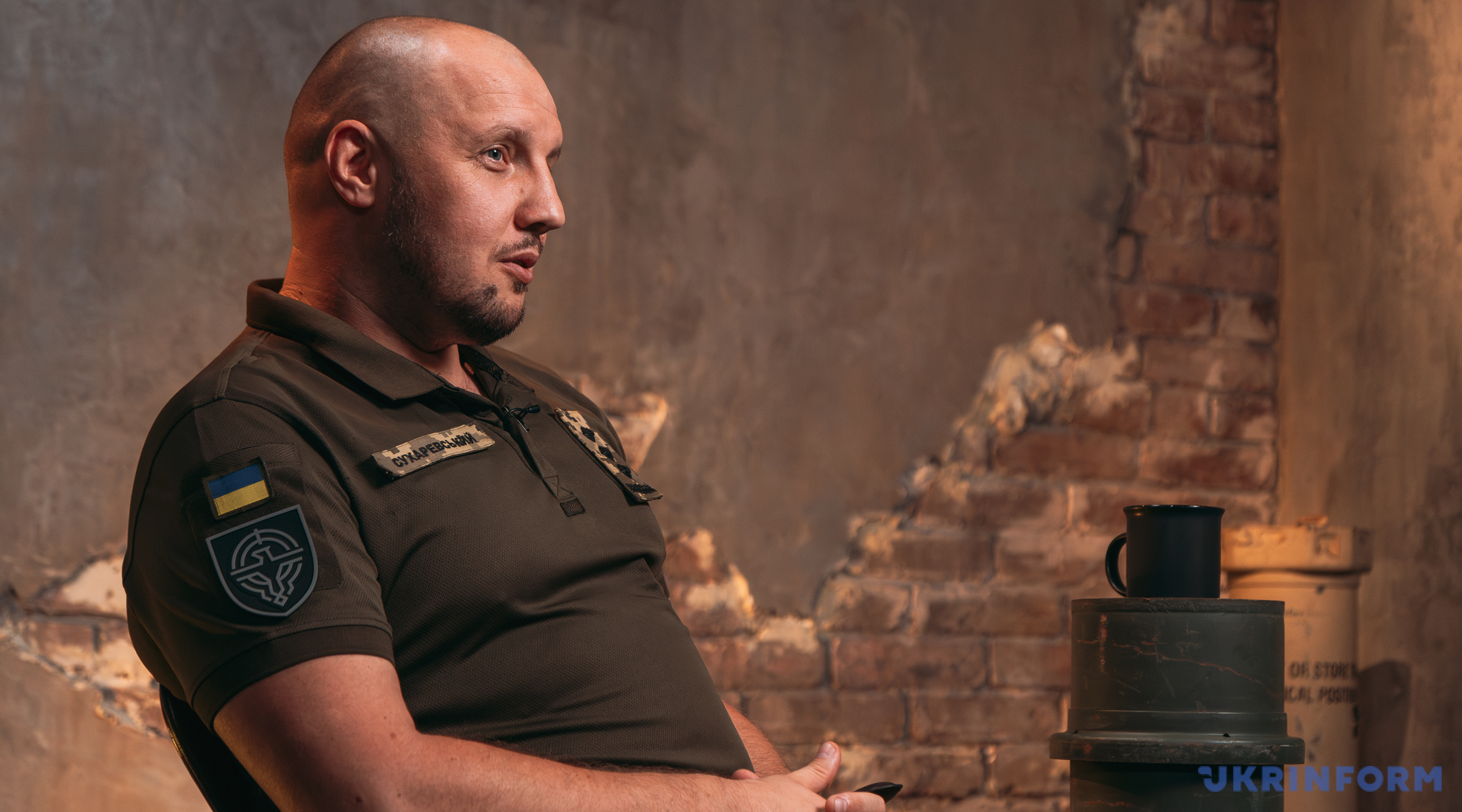
- Not enough. A recruitment campaign has been launched, the work is underway, but there are always categories of the population who hat are ready and willing - and they have options, actually. As for those who are not willing, we, firstly, do not want such people, and, secondly, one needs to get something changed inside his self, his head, soul, heart, in order to gain an understanding that he is same as others, that never will he be able to avoid this war, to avoid questions to himself about where he was and what he was doing. And in terms of the effective investment of a person’s mental and physical capabilities in unmanned systems, an opportunity to be useful, even with a hurting back or knees - this is an option for those who are willing and for those who can. People, thank God, are coming, believing, and our task is not to let down people's faith in us and to give them an opportunity to fulfil their potentialities. This is perhaps the number-one priority in work for the whole team of the Unmanned Systems Forces.
- Aircraft drones aside, what about maritime drones, which, as we know, have already proved so effective? Where did the idea originate from, and what new designs, if any, are on plan for development?
- In comments above I have already mentioned the Ukrainian phenomenon, the smartness inherent in the Ukrainians. I would omit technical and organizational aspects, will only say that soon enough we, as a maritime country, will have a strong argument at sea, which will give us a good practical basis in terms of a capability to effectively secure our maritime boundaries and coastline.
- Does that mean to say that the adversary is in for surprises from the forces you lead?
- Definitely yes. We have enough imagination, as well as enough thirst, even more of experience and expertise, and so we are going to develop and invent in this domain. This will result in an outrage from Russian hawks, in adversary forces being annihilated in industrial quantities, and in the holy Ukrainian Victory achieved.
- Would you tell us about humanitarian operations, as, for example, in Krynky, where our soldiers holding a bridgehead there were able to survive thanks to proficient support from UAV operators?
- Basically, Krynky was an extremely challenging, complex operation, and for me this is precisely in terms of the humanitarian work done by operators of unmanned systems of various types of. First and foremost, this operation heralds the emergence and systematization of the use of unmanned systems as a logistics component. Because where there is talk about unmanned craft, about bomber aircraft delivering various supplies across the river, this is about the huge experience, the path that operators of unmanned systems of various sizes and purposes have traveled side by side with manufacturers, with soldiers, with the same goal in mind: to save lives, to help out. What this experience produced actually was an impetus for the development of new tactics, a new direction in the development of unmanned technologies. I offer my honor and respect to the pilots who assisted in this operation.
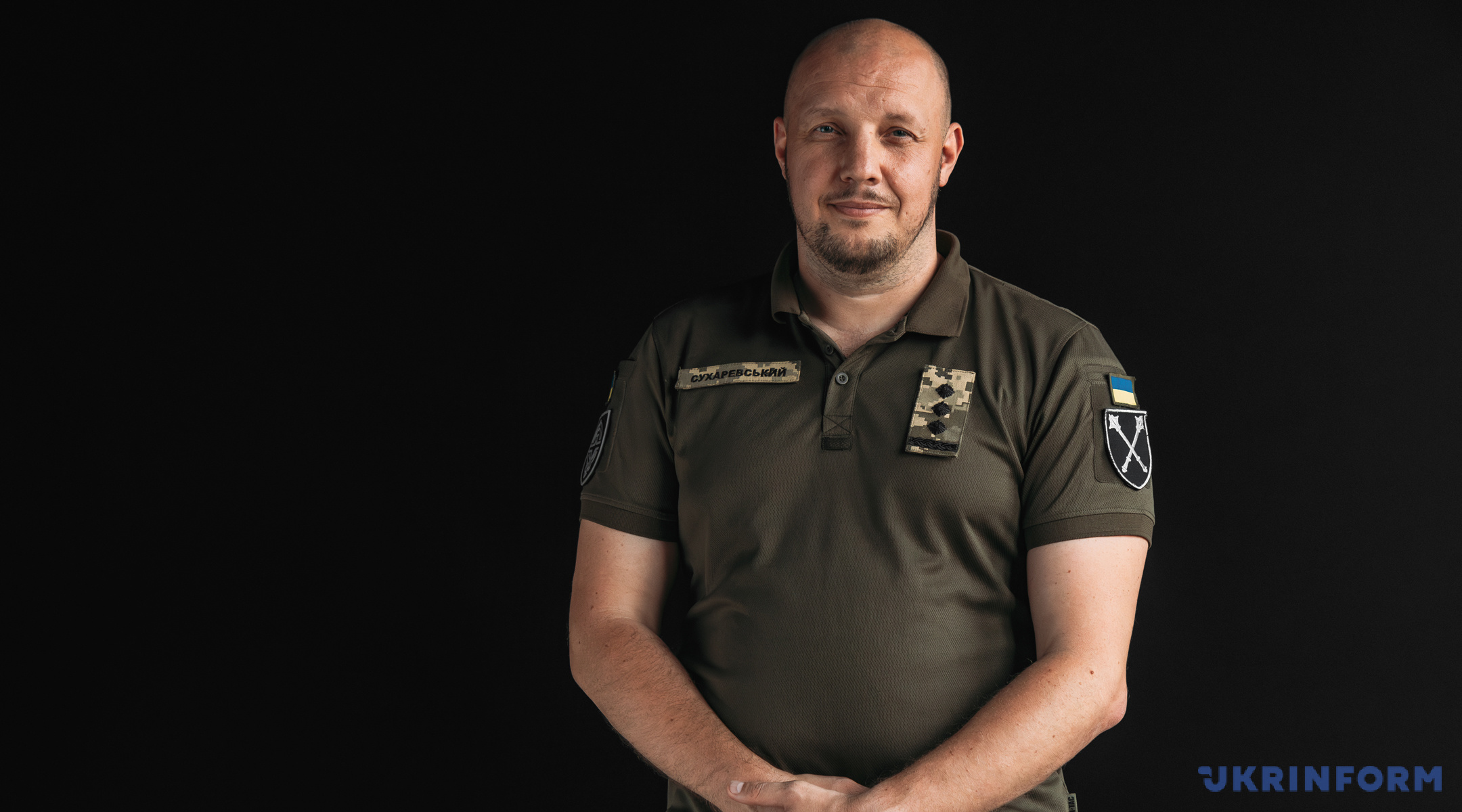
- Fate.
- There is none.
- Fifty-fifty.
- Agnostic views.
- Neither that nor that.
- Man.
- Moksha.
- Spend as much time as possible with family.
- Faith, strength, indomitable spirit.
